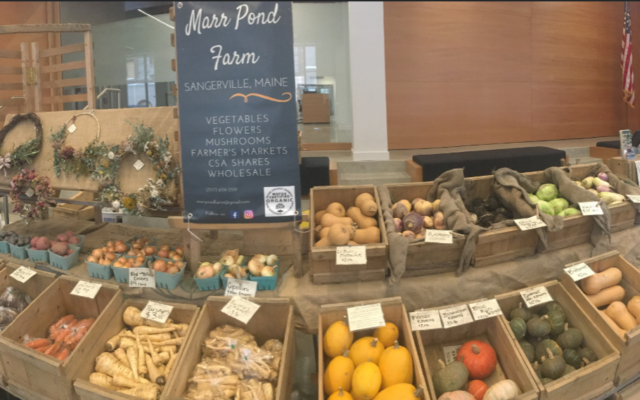
Why buying a share in a local farm’s season might be a very good investment this year
Supply chains have been disrupted and some grocery store shelves remain bare, but at Maine’s farms, the growing season is beginning in earnest. In a time when the state’s governor determines what is an essential business, community-supported agriculture in Maine could become one of the most essential purchases for families struggling to put quality foods on their tables.
Farms throughout the state offer CSA programs, allowing local people to pay upfront for a share of the year’s harvest, growing locally with minimal handling or transportation.
And it could be a win-win for the farms as well. Spring is when Maine farmers spend a lot more money than they earn as they purchase seeds, fertilizer, equipment and pay labor costs but have few crops to sell. Steps to reduce the spread of COVID-19 in Maine have only exacerbated that situation and many farmers have seen wholesale and retail sales falling off or drying up entirely. Cash from CSA sales could help get them through a financially-lean period.
Is a CSA right for you?
How traditional CSAs work
Think of a CSA as a subscription box for local food. Consumers pay a certain amount upfront for the CSA membership and receive weekly shares of the crops from those farms for a specified duration during the growing season.
“CSAs are a great way to support local farms,” said Sarah Alexander, executive director of the Maine Organic Farmers and Gardeners Association. “And we are seeing in times like this just how important local food and our farmers really are.”
Alexander said most Mainers live in near proximity to at least one certified organic farm offering CSAs. MOFGA maintains a database of certified organic farms offering CSAs. More recently, University of Maine Cooperative Extension introduced an online database mapping Maine farms and ways to access their products beyond CSAs.
Marr Pond Farm in Sangerville is among the hundreds of farms around the state offering a CSA this year. Owners Courtney Williams and Ryan Clarke are preparing for the growing season.
For Williams, a CSA membership commitment is both a moral and financial shot in the arm
“It means a lot,” she said. “It tells us ‘I want your food all season and I am willing to support you and spend my money ahead of time.’”
Of course, CSAs aren’t without risks. There’s no guarantee of a specific amount of produce, for instance. So if it’s a bad tomato year, the share will reflect that. However, assuming the risks of farming will allow the consumer to help the farm have necessary capital for the growing season.
“This time of year we incur a lot of expenses with purchasing seeds, getting our fertilizer and bringing on workers,” Williams said. “We are spending far more than we are making and when you are uncertain how much you will make in a season, selling CSA shares is crucial.”
Buying local can reduce physical exposure
This year, more than ever, there are added benefits to CSAs. For instance, in this time of physical distancing, picking up a CSA share can mean almost zero interaction with or exposure to other people.
“Farmers are getting really creative with how they offer CSAs this year,” Alexander said. “Some are offering the option of purchasing a membership ahead of time but letting their customers select each week what they want [and] are planning to pack up the CSAs and make them available for pickup without ever having to meet face-to-face.”
Williams said she plans to supply her CSA members with up-to-date lists of what is available from her farm before they place orders, so they can avoid coming to the farm to view her selections.
That’s an attractive alternative to shopping in grocery stores, said Erin Parisien, who owns Aroostook Beef Company in New Canada with her husband. They operate a beef CSA that provides meat to customers from Bangor to Fort Kent.
“When you shop in a supermarket or chain grocery store and purchase food from out of state, so many people have already touched it before it got here and who knows how many touched it once in the store,” Parisien said. “When you buy from us, I’m the only one who touches it — I take the orders, I package the orders, I drop off the orders [so] the supply chain is me.”
Local food is supply chain resistant
While it’s impossible to tell what the overall impact of the pandemic to the food supply chain will be, locally the supply chain saw immediate disruptions at grocery stores when Maine was first hit with COVID-19 cases. At stores throughout the state, some shelves were near empty — most notably of toilet paper and cleaning supplies — and certain food items including chicken, pasta, flour and dried beans. Grocery stores are still working to restock them.
With CSAs, that isn’t an issue. CSA customers buy a share of a farm’s produce, so they don’t have to worry about a run on items because their share is already reserved. Furthermore, it’s insulated from other disruptions to the supply chain — such as shipping issues and delays — because the food goes from its local point of origin at small, self-sustaining farms directly to the consumer. Likewise, labor needs are most often met by the farmers, their family and a few hired hands.
Spending locally on a CSA is more important now than ever
The money invested in CSAs doesn’t just result in a supply of fruits and veggies. It also helps the local economy.
“There is no overstating the importance of how far a dollar you spend with a local farmer goes in your community,” Alexander said. “The economic multiplier suggests that for every dollar you spend [with a farmer], it will be re-spent seven more times in the community.”